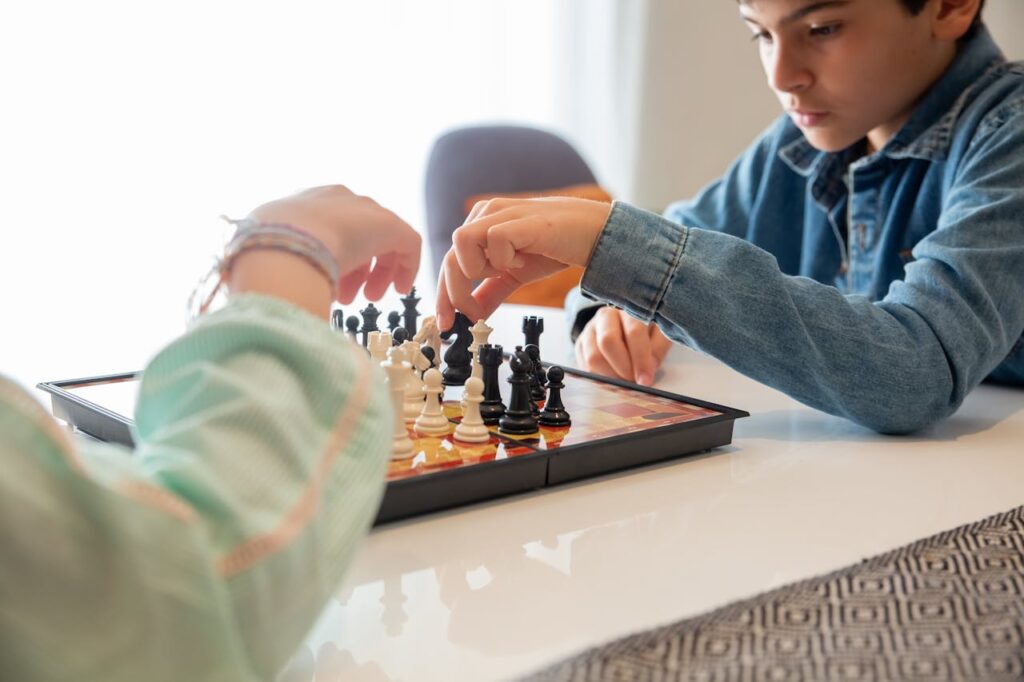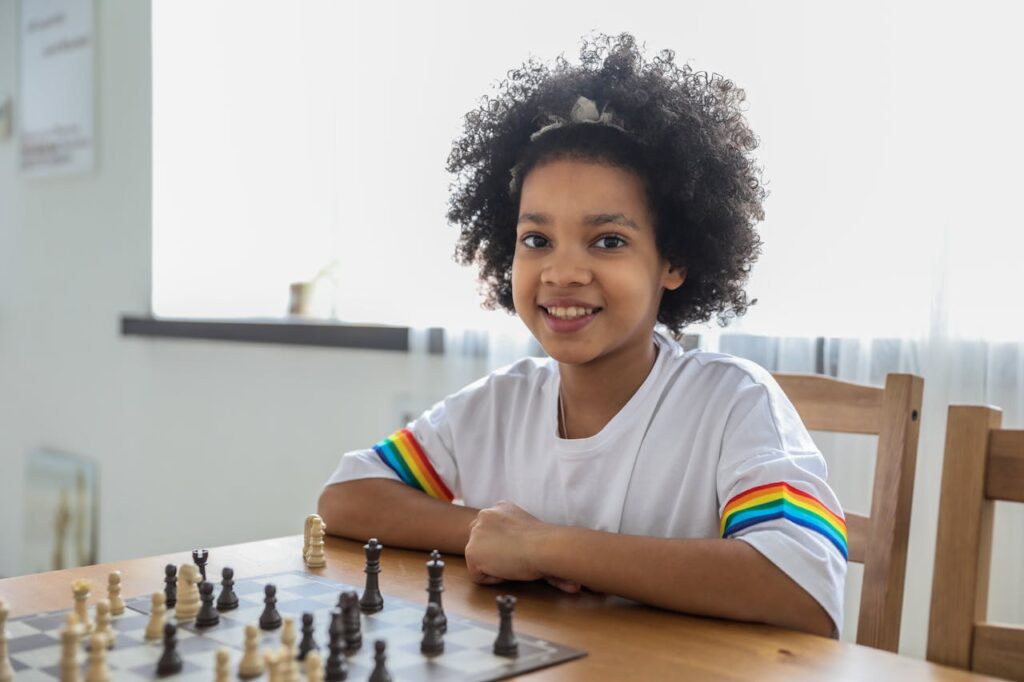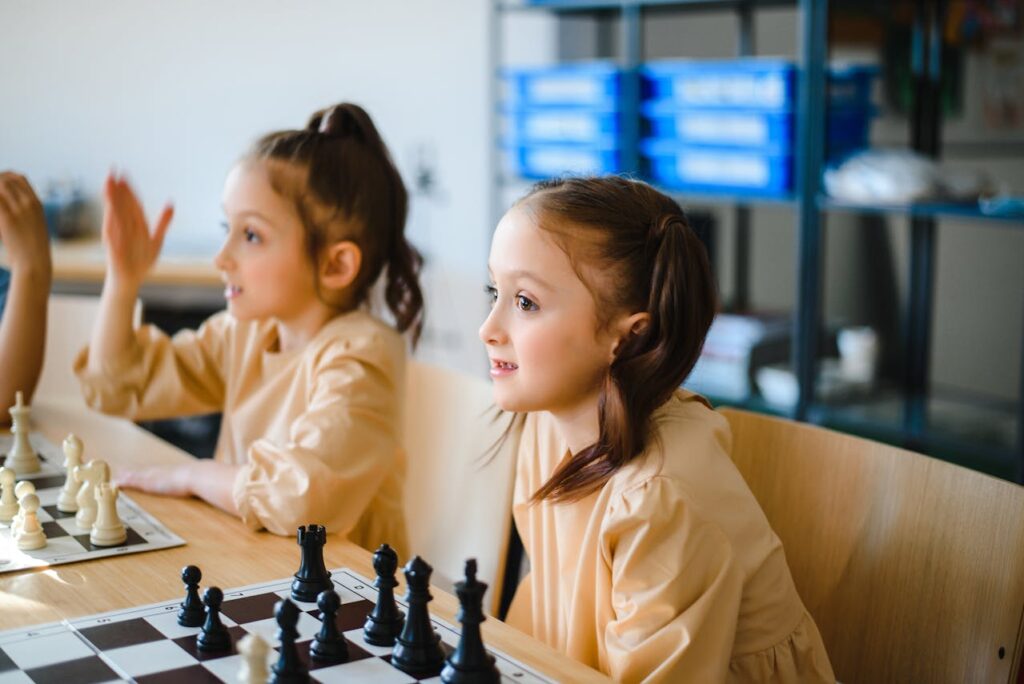In a world where instant gratification is the norm, teaching children the values of patience and focus has never been more important. These skills are crucial not only for academic success but also for personal growth and long-term achievement.
One of the most effective and enjoyable ways to develop these qualities is through the game of chess. Chess, often seen as just a board game, is actually a powerful tool that can help children learn to concentrate deeply and practice patience.
The Role of Patience in Chess
Patience is a key ingredient for success in chess. Unlike many games that rely on quick reflexes or immediate responses, chess requires players to slow down, think carefully, and plan their moves several steps ahead.
Learning to Wait for the Right Moment
In chess, there are moments when the best move is to wait.
Whether it’s holding back a powerful piece until the timing is perfect or resisting the urge to attack prematurely, players must often exercise patience to set up a successful strategy.
This practice of waiting for the right moment helps children understand that not every opportunity should be taken immediately and that sometimes, patience can lead to greater rewards.
For example, a child might learn that advancing a pawn too quickly could expose their more valuable pieces to danger.
Instead, they might wait, positioning their pieces more strategically before making a move.
This experience teaches them that good things come to those who wait and that rushing can often lead to mistakes.

Practicing Patience Through Long Games
Chess games can be long, sometimes lasting several hours. This extended playtime is an excellent opportunity for children to practice patience.
Unlike fast-paced games that end quickly, chess requires sustained focus and the ability to keep thinking clearly, even as the game stretches on.
This endurance helps children build the mental stamina needed to stay patient over long periods.
For instance, a child playing a lengthy chess match must maintain their concentration and resist the urge to make hasty moves as the game progresses.
They learn to pace themselves, stay calm, and keep their mind engaged, even when the game becomes challenging or when they start to feel tired.
This ability to stay patient and focused over time is a skill that will benefit them in many areas of life, from completing long-term projects to studying for exams.
Managing Frustration and Emotions
Patience is also about managing frustration, especially when things don’t go as planned.
In chess, it’s common to encounter setbacks—an opponent might make an unexpected move, or a carefully planned strategy might fail.
Learning to stay patient and not let frustration take over is an essential part of becoming a better chess player, and it’s a lesson that extends to other areas of life as well.
For example, a child might lose a piece they had carefully positioned, or they might fall into a trap set by their opponent.
Instead of getting upset and making impulsive decisions, they must learn to take a deep breath, reassess the situation, and continue playing with a clear mind.
This experience teaches them to control their emotions and stay patient, even when faced with difficulties.
The Role of Focus in Chess
Focus is another critical skill that chess helps to develop. The game demands intense concentration and the ability to think several steps ahead while considering various possibilities.
Every move requires careful thought, and even a momentary lapse in focus can result in a costly mistake.
Developing Deep Concentration
In a typical chess game, players must focus on multiple factors simultaneously—the position of their own pieces, potential threats from their opponent, and possible future moves.
This requires a level of concentration that many other activities do not demand. As children play chess, they learn to shut out distractions and focus deeply on the task at hand.

For example, during a chess match, a child might be faced with a complex situation where their king is under threat.
To find the best move, they need to consider all possible responses, think about the long-term consequences of each option, and choose the strategy that offers the best chance of success.
This intense concentration helps them develop the ability to focus for extended periods, a skill that is crucial for academic success.
Enhancing Attention to Detail
Chess also sharpens attention to detail. Every move on the chessboard matters, and even the smallest oversight can lead to significant consequences.
As children play chess, they learn to pay close attention to every aspect of the game, from the positioning of pieces to the potential threats posed by their opponent.
For instance, a child might notice that their opponent’s knight is in a position that could threaten their queen in the next move.
Recognizing this detail allows them to take preventative action, such as moving their queen to safety or countering the threat with another piece.
This practice of noticing and responding to small details strengthens their ability to pay attention in other areas of life as well.
Building Mental Discipline
Mental discipline—the ability to stay focused and control one’s thoughts—is another important skill that chess fosters.
The game requires players to stick to their strategy, avoid distractions, and think carefully about each move.
This mental discipline is essential for success in chess, as it helps players avoid impulsive decisions and stay focused on their long-term goals.
For example, during a game, a child might be tempted to make an aggressive move that could lead to a quick advantage.
However, if they’ve learned to stay disciplined, they might realize that this move could expose their king to a counterattack.
By sticking to their strategy and thinking carefully about the consequences, they can make a more informed decision that aligns with their overall game plan.
Strengthening Short-Term and Long-Term Focus
Chess requires both short-term and long-term focus. In the short term, players must concentrate on their immediate move, considering how it will impact the current state of the game.
In the long term, they must think several moves ahead, planning their strategy and anticipating their opponent’s responses.

By practicing both types of focus in chess, children develop a balanced ability to concentrate on both immediate tasks and long-term goals.
For example, in the short term, a child might focus on protecting a vulnerable piece from an imminent threat.
In the long term, they might be working towards a strategy to checkmate their opponent, carefully planning each move to align with this goal.
This ability to switch between short-term and long-term focus is crucial for success in both chess and life.
The Connection Between Patience, Focus, and Success
Chess is a unique game in that it combines the need for both patience and focus in a way that directly contributes to a player’s success.
These two skills are deeply interconnected, and mastering them through chess can have a profound impact on a child’s overall development.
Understanding the Long Game
One of the most valuable lessons chess teaches is the importance of playing the long game—thinking beyond immediate gains and considering the bigger picture.
In chess, quick wins are rare, and players who focus solely on immediate rewards often find themselves at a disadvantage.
Instead, success in chess comes from patiently building a strong position, carefully planning each move, and staying focused on the long-term goal of checkmating the opponent.
For example, a child might be tempted to capture an opponent’s pawn early in the game, seeing it as an easy win.
However, a more experienced player knows that this immediate gain could leave them vulnerable to a counterattack.
Building Resilience Through Setbacks
Chess is a game where setbacks are common. Even the most skilled players make mistakes, and there are times when an opponent outmaneuvers them despite their best efforts.
Learning to handle these setbacks with patience and focus is crucial for developing resilience, a quality that is essential for long-term success in any field.
For instance, a child might lose a game despite playing well because of one critical mistake.
Instead of getting discouraged, they can review the game, understand where they went wrong, and learn from the experience.
This process teaches them that setbacks are not the end but opportunities to improve.
Applying Patience and Focus Beyond the Chessboard
The skills of patience and focus developed through chess are not confined to the game—they can be applied to almost every area of life.
Whether in academics, personal relationships, or future careers, these qualities are key to achieving success and fulfillment.
In academics, for example, students who are patient and focused are more likely to excel.
They approach their studies with a calm, methodical mindset, breaking down complex tasks into manageable parts and working steadily towards their goals.
Whether it’s studying for an exam, completing a long-term project, or mastering a difficult concept, the patience and focus learned through chess help students achieve their academic potential.
In personal relationships, patience and focus are equally important. Relationships, whether with friends, family, or colleagues, require the ability to listen, understand, and respond thoughtfully.
The Role of Practice in Strengthening Patience and Focus
Like any skill, patience and focus can be strengthened through practice, and chess provides an ideal environment for this practice.
Each game is an opportunity to exercise these skills, whether it’s by patiently waiting for the right moment to make a move or by staying focused during a long match.

Over time, regular chess practice helps children build these qualities to a high level.
For example, a child who plays chess daily will gradually develop the ability to stay focused for longer periods and remain patient even when the game doesn’t go as planned.
They learn to enjoy the process of thinking deeply, planning carefully, and executing their strategy with precision.
This consistent practice not only makes them better chess players but also more patient and focused individuals overall.
The Long-Term Benefits of Patience and Focus
The skills of patience and focus cultivated through chess offer long-term benefits that extend far beyond childhood.
As children grow into adulthood, these qualities become even more critical in navigating the complexities of life.
Academic Achievement and Lifelong Learning
Patience and focus are crucial for academic success.
In school, students are often required to engage in tasks that demand sustained attention, such as reading lengthy texts, solving complex problems, or conducting detailed research.
The ability to focus deeply on these tasks without becoming distracted or frustrated is essential for achieving high levels of academic performance.
For example, a student studying for a major exam must be able to concentrate on their revision, absorb large amounts of information, and retain that knowledge over time.
This requires not only focus but also the patience to sit through hours of study without giving up.
Career Success and Professional Development
In the professional world, the ability to stay patient and focused is often the difference between success and mediocrity.
Many careers require individuals to work on long-term projects, manage complex tasks, and solve problems that don’t have immediate solutions.
The patience to see a project through to completion and the focus to maintain high standards over time are invaluable assets in any field.
For instance, in professions such as engineering, medicine, or law, projects and cases can span months or even years.
Success in these fields often depends on the ability to remain patient during slow progress and to focus on the details without losing sight of the larger goals.
The discipline learned through chess equips individuals with these qualities, making them more effective and resilient professionals.
Personal Growth and Well-Being
Beyond academics and career success, patience and focus are essential for personal growth and well-being.
Life is full of challenges, from personal setbacks to difficult relationships, and the ability to navigate these challenges with patience and focus is key to maintaining emotional balance and achieving personal goals.
For example, someone who is trying to develop a new habit, such as exercising regularly or eating healthier, needs both patience and focus to stay committed to their goals.
The initial excitement of starting something new often wears off, and it’s during these times that patience and focus become crucial.
Chess teaches individuals to stick with their plans, even when progress is slow, and to focus on the long-term benefits rather than immediate gratification.
How to Encourage Patience and Focus Through Chess
Given the numerous benefits of patience and focus developed through chess, parents, educators, and mentors might wonder how best to encourage these qualities in children.
Start with Short, Regular Sessions
To build patience and focus, it’s important to start with manageable goals.
Begin with short, regular chess sessions—perhaps 15 to 30 minutes a day—where the focus is on enjoying the game and gradually developing skills.
Over time, as the child becomes more comfortable with the game, these sessions can be extended.
For example, a child might start by learning the basics of how the pieces move and practicing simple checkmates.
As they gain confidence, they can move on to more complex strategies and longer games. The key is to build up their endurance and focus gradually, making the learning process enjoyable and rewarding.
Focus on the Process, Not Just Winning
While winning can be a great motivator, the real value of chess lies in the learning process.
Encourage children to focus on the strategies they’re developing, the mistakes they’re learning from, and the progress they’re making, rather than just the outcome of the game.
This approach helps them develop a growth mindset, where the emphasis is on improving skills and enjoying the game, rather than solely on winning.
For instance, after a game, instead of focusing on who won or lost, discuss what strategies worked well, what could be improved, and what was learned from the experience.
This reflective process reinforces the importance of patience and focus in improving their game and helps them see setbacks as opportunities for growth.
Play Different Opponents
Playing against different opponents, with varying skill levels, can help children develop greater patience and focus.
Facing stronger players teaches them to be patient, as they often need to think more carefully and strategically to compete.
Playing against less experienced opponents helps them focus on refining their techniques and learning to recognize mistakes, both theirs and their opponent’s.
For example, a child might learn to adapt their strategies depending on the opponent, which requires patience in assessing the situation and focus in executing their plan.
This variety in play keeps the game challenging and engaging, further developing the skills of patience and focus.

Use Chess Puzzles and Challenges
Chess puzzles and specific challenges, such as finding the best move in a given position or solving a checkmate in a set number of moves, can help enhance patience and focus.
These puzzles encourage deep thinking and the careful consideration of different possibilities, reinforcing the importance of taking one’s time to find the best solution.
For example, solving a chess puzzle might involve thinking several moves ahead and considering multiple potential outcomes.
This practice not only improves their chess skills but also strengthens their ability to focus on complex tasks and remain patient while working through them.
Encourage Participation in Chess Clubs or Tournaments
Joining a chess club or participating in tournaments can further enhance a child’s patience and focus.
These settings provide a structured environment where children can play regularly, learn from others, and challenge themselves against a variety of opponents.
The competitive aspect of tournaments also teaches children to stay calm under pressure, focus on their game, and be patient as they work towards their goals.
For instance, participating in a tournament might require a child to play several games in a day, each one requiring sustained focus and patience.
Conclusion
Chess is more than just a game; it’s a lifelong teacher that imparts invaluable lessons in patience and focus.
These skills, developed on the chessboard, extend far beyond the game and become integral to a child’s success in school, relationships, career, and personal growth.
By making chess a regular part of their routine, children learn to think critically, stay focused on their goals, and approach challenges with patience and resilience.
At the Global School of Chess, we are passionate about helping children develop these essential skills through the game of chess.
Our programs are designed to nurture patience and focus in a fun and engaging way, providing children with the tools they need to succeed both on and off the chessboard.
READ NEXT:
- Chess for Kids: Building Stronger Memory One Move at a Time
- The Surprising Link Between Chess and Better School Performance
- Chess and Emotional Resilience: Strengthening Mental Health in Adults
- The Science Behind Chess and Improved Decision-Making for Adults
- How Chess Sharpens the Adult Brain: A Cognitive Powerhouse
- How Chess Helps Adults Stay Mentally Agile
- How Chess Builds Resilience in Children

